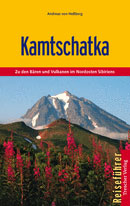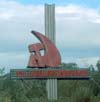Information for traveling Kamchatka
| World
wide the only travel guide book specifically about Kamtschatka Kamtschatka - Zu den Bären und Vulkanen im Nordosten Sibiriens, Trescher Verlag, Berlin. 336 Seiten. ISBN 978-3-89794-195-3 (second edition) 18.95 € |
| Information about cycling and trekking |
| Road
and traffic conditions: The main track in the Kamchatka
valley basically consists of one pot-hole next to the other with stretches
of fist-sized rocks embedded in the surface, but it is well to bike-ride
in general. Smaller side tracks can be extremely dusty or muddy and
rivers crossing the side tracks are usually without bridges. Be aware
that there are almost no road signs marking turn-offs from
the main road, so sometimes navigation is tricky. The main road from Petropavlovsk to Ust Kamchatky has heavy truck traffic and is quite dusty, and generally the roads around Petropavlovsk are quite busy. Be aware: A majority of car drivers has Japanese cars made for left-side traffic, but there is right-side traffic in Russia. Quite a number of memorial monuments of fatal accidents can be seen along the main roads... Unfortunately there have been reports of drivers mugging cyclists between Petropavlovsk and the village Sokotch (however, villagers and other drivers tend to help). Hitchhiking: no problem. |
|
 
|
Maps
and navigation: There is a Tourist map of Kamchatka
(1:1.000.000) which is very good for rough navigation and for cycling,
but not detailed enough for a trekking tour. The map can be obtained
in book stores in Petropavlovsk. It may be necessary to check in different
stores since not many copies are held in stock. Ordnance topographic maps (1:200.000) can be downloaded as jpg at mapstor. These maps are four-color prints and very good and detailed enough for a trekking expedition. Recently, three-color print topographic atlases of Kamchatka (1:200.000) has become available in bookstores in Petropavlovsk: one atlas for Central Kamchatka including the Kliuchevskoy region, and one for South Kamchatka. A GPS device is advisory for trekking tours through the wilderness away from the main tracks. In combination with a good topographic map it is extremely useful for positioning and navigation in dense birch forests and tall perennial vegetation and on foggy days. Some GPS waypoints. |
| Food:
you can buy most food (including good milk powder!) on markets or
in shops in Petropavlovsk and smaller villages along the main road/track.
In Petropavlovsk and Elisovo there now are even big super markets
that have everything you can think of. Fresh vegetables, berries, milk, bread, and potatos is available on farmers markets along the road especially in late summer. |
|
| Water:
water from rivers and lakes is available in most regions, no purification
is needed. However, be aware that there are quite a lot of creeks that dry out in summer, especially higher elevations of central Kamchatka. |
|
| Bears:
Since bears are still being hunted, they usually have great respect
of humans, and in most cases they will immediately disappear. However,
remember the local saying "A bear being fed is a dangerous
bear". Especially in the regions around Petropavlovsk, bears
have started to adapt to humans and tend to hang around camps. Thus,
burn all traces of food when leaving your camp, and don't set up camp
directly at the river banks where bears like to fish. |
|
| Mosquitos
and black flies: they are everywhere, and they are very
nasty and agressive. Threre are even several species adapted to different
environments. If possible, wear light colored clothing as mosquitos
are attracted by dark colors. A bug shirt or mosquito net over the
face is useful when riding or walking through moist forest areas.
Mosquitos are less active at higher altitude, and in the fall season. |
|
Other
things: Kamchatka requires robust and reliable gear. Specialized
spare parts are still hard to get, although basic outdoor equipment
can be bought in local outdoor stores in Petropavlovsk. Be prepared for extende periods of rain... Hiking boots need to be very robust. Volcanic rocks, dense vegetation, and wet conditions (river crossings) will wear them out extremely fast. |
| Information about visa formalities |
| For
visiting Russia (and Kamchatka) you need a visa (if you are from a
Western country like Europe, North America, Australia). For your visa-application
you need a visa support from a Russian agency. It is most convenient
to obtain the visa support through a visa agency. For stays longer
than one month it is necessary to get a business visa, the only difference
to a tourist visa is that it is going to be a lot more expensive.
General travel information for Russia |
|
Forbidden
regions? Kamchatka is open to tourists only since 1991 and remains important region for the Russian military. Kamchatka also is a Russian border zone. Therefore, entry to several regions and cities in Kamchatka in the past had required special permits or was not allowed at all. These restrictions are nowadays being removed, but as an individual tourist, be prepared to be checked for your passport and visa information around formerly closed regions. |
|











